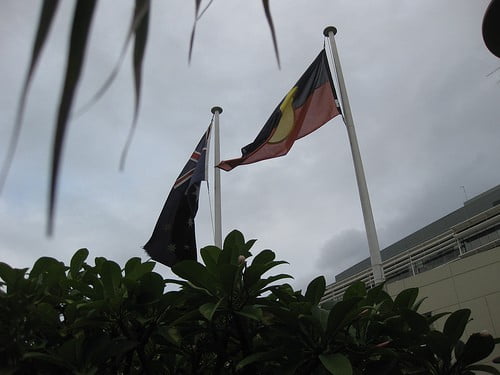
Today (26 January) is my national day; Australia Day. On this day in 1788, our first Governor Captain Arthur Phillip arrived in Sydney Cove with the First Fleet to establish the first British Penal Colony. An “interesting’ event to celebrate on many levels, but officially we celebrate the country, its culture and achievements. I suppose in the traumatised and sectarian post 911 world we currently live in, we are supposed to celebrate our freedom and democracy too.
The event started as a celebration by emancipated convicts, though given the harsh conditions they endured it’s hard to know whether they celebrated their survival or the country. In any case, as time passed it became a political campaign for equality with British free settlers. In 1818 Governor Lachlan Macquarie formalised the celebration as Foundation Day and granted the day as a holiday for government workers, allowing extra meat rations and ordering a 30 gun salute (30th anniversary). The name Australia Day was formally adopted in 1935. Even then the date was problematic, and other dates considered included 1 January (Federation – the first day of independent self-governance) and December 3 (the Eureka Stockade – a rebellion of miners) which have their own issues as well.
The country was colonised on the “belief” that the land was unoccupied, and this belief still has impacts for aboriginals today in terms of self-governance and an individual’s right to choose their destiny. As you would expect, there is a history of border skirmishes, rapes, massacres, forced relocation to church run reservations (missions), aboriginal children removed from their families and sent away for adoption, and efforts to retrieve human remains and religious or ceremonial artefacts from international museums. As a result, First Nations people call it Survival Day, (or Invasion Day or Day of Mourning), and mourn the loss of land, culture and family.
Naturally there are other more extreme fringe views, but I choose not to mention them.
The meaning of the day has become vague over time with different waves of migration from around the world muddying the waters, before and after the White Australia Policy. Different Prime Ministers attempted to shape the way we identify ourselves through policies of assimilation and multiculturalism. We’ve had “Values Statements” and “Principles and Responsibilities”. And the current government tells us that the asylum seekers held indefinitely in off-shore detention while their refugee status claims are processed are all illegal queue jumping terrorists who do not share the core Australian values and therefore do not belong here.
In reality, most of the country gets the day off work, has a party and probably drinks too much. Old school celebrations will include cricket – backyard rules of course. In a wave of modern nationalism, it is becoming a “thing”. People drape themselves in flags and berate those thought to be un-Australian, which in my opinion is tricky because who knows what it is to be Australian these days (aside from aforementioned politicians and media moguls of course). My own family got together with other British expatriates to mourn the loss of “home”, which in retrospect is ridiculous because there was nothing to prevent them from returning. Others fleeing war or persecution celebrate their luck in being here and not there.
Officially there are flag-raising and citizenship ceremonies, sporting events, festivals, parades and fireworks. Some Australians are recognised as role models and for their achievements and commitment to a better Australia. Others thought to have made remarkable achievements or of great service are awarded honours by the Governor General on behalf of the Queen. Unofficially there is as much Australian flag and/or green and gold merchandise you could ever ask for, and last year at least, that included condoms. The Meat and Livestock Association’s ongoing and amusing “Lamb on Australia Day” campaign (has sound and starts playing immediately), probably contributed a great deal to the development of what is becoming more of a marketing event than an observance (despite the lack of special edition Australia Day Caramello Koalas which seems to me the obvious consumable).
So where does that leave Australians now? And who are we anyway? We’re a relatively new country that doesn’t have a single identity. We don’t have something like a War of Independence that binds us together. The displacement of the first peoples is largely unacknowledged, as is the forced relocation of its first settlers. Even our county’s name basically means unknown southern land (in Latin “terra australis incognita”). Despite achieving self-governance relatively early in our history, we remained basically a British isle through to around the 1960s (according to assorted great relatives who recall things like standing for “God Save the Queen” at the picture theatre).
I think there needs to be a day that we can all celebrate in our own way, but which day that should be remains problematic.
Leave a Reply